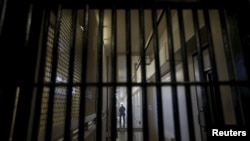Stacked in cells five stories high and dozens across, the death-row inmates at California's San Quentin prison embody a political stalemate that has swollen their ranks to more than 700 — a quarter of all U.S. prisoners awaiting execution.
America's most populous state, which has not carried out an execution in a decade, begins 2016 at a pivotal juncture, as legal developments hasten the march toward resuming executions, while opponents seek to end the death penalty at the ballot box.
"There's no truth in sentencing in this state," said Sacramento County prosecutor Anne Marie Schubert, who favors speeding up executions. "We have to make a decision on what we're going to do."
This month, the state is holding a hearing on a proposed new protocol for lethal injection that would use one drug, a barbiturate, to put condemned inmates to death, rather than a three-drug cocktail declared unconstitutional by a California court 10 years ago because it could possibly cause pain.
Death penalty opponents are gathering signatures to place a measure on the November ballot that would outlaw the death penalty in the state. At the same time, supporters of capital punishment are seeking support for an initiative to speed up the execution process.
“California has a history of driving the car in both directions at the same time,” said Robert Dunham, executive director of the Death Penalty Information Center, which documents U.S. death penalty cases.
California's conflicting choices on the death penalty come as support for capital punishment wanes across the United States. They reflect the tangled political climate in a state where voters have repeatedly endorsed capital punishment even as top officials have come to oppose it.
The result is a situation in which execution remains a choice for juries and is favored by many prosecutors, but where there is little political will to enforce the sentences.
California juries have sentenced nearly 900 people to death since 1978, but only 13 have been executed. Sixty-eight have died of natural causes, 36 more for other reasons.
Of the 751 remaining inmates, most of them housed at San Quentin, seven have been on death row since the 1970s. Three are more than 80 years old. A row of wheelchairs sits across from the tiers of cells in the prison's East Block.
The death chamber sits unused despite an $850,000 court-ordered remodel. Anticipating more convictions, officials in coming weeks will open a new death-row wing. The state has constructed an in-patient psychiatric hospital to handle the needs of death-row inmates.
San Quentin's warden, Ronald Davis, took the job a year ago focused more on the rehabilitation and education programs offered at the state prison than its role as a facility for executions.
"If I have to preside over one, I would try to view it as part of my job and step up to the responsibility," Davis said.
Dwindling support
Last year, U.S. states conducted 28 executions - the fewest since 1991 - and imposed the lowest number of death sentences since 1978, said Dunham.
A majority of Americans, about 56 percent, still support the death penalty, the lowest number in 40 years, a poll conducted last year by the Pew Research Center showed.
Helping drive the change are the success of DNA testing and advocacy by groups such as the Innocence Project in exonerating wrongly convicted death-row prisoners. In 2015, six condemned inmates were cleared in the United States, bringing the total to 156 since such efforts began to be tracked in 1973, Dunham said.
Last year, Nebraska became the 19th state to abolish capital punishment.
Texas led the country in executing 13 people in 2015, for a total of 531 over the past 40 years, according to state corrections records compiled by the Death Penalty Information Center.
The last person executed in California was Clarence Ray Allen, put to death in 2006 at age 76 for the murders of three people more than 25 years earlier. Soon afterward, a court ruling outlawed the state's lethal injection protocol, and capital punishment stopped while the state filed appeals.
The state, in a settlement with victims' families, has announced plans for a new lethal injection protocol. Before it is used, the state must take comments and testimony from the public, a process that could take up to a year.
The death penalty has been a hot-button issue for California Democratic Governor Jerry Brown. Brown has promised to uphold the state's death penalty laws and abide by the lethal injection settlement, but declined Reuters' request for comment.
In his previous tenure as governor from 1975 to 1983, Brown vetoed a bill reinstating capital punishment after the U.S. Supreme Court declared it was being administered in an unconstitutional manner. His veto was overridden.
Opposition to capital punishment by Democratic Attorney General and U.S. Senate candidate Kamala Harris has led death penalty advocates to be skeptical that executions will resume anytime soon.
"It's certainly not going to happen before the election," said Schubert.





